Tolstoy & Dante: Experiencing Ecstasy (Standing Outside Oneself)
(Purgatorio, Canto XV): Dante experiencing ecstasy, remedy for wrath and more
Those of you who clicked because of Leo Tolstoy proceed to the section called ‘Philosophical Exercises’.
Welcome to Dante Read-Along, more on it below.
Welcome to Dante Read-Along! ✨
(If this post appears truncated in your inbox you can read it on the web by clicking here. )
Welcome to Dante Book Club, where you and I descend into Hell and Purgatory to be able to ascend to Paradise. Our guide is the great Roman poet Virgil and in this Fifteenth Canto of the Purgatorio, Dante has an ecstatic vision of Meekness. You can find the main page of the read-along right here, reading schedule here, and the list of chat threads here.
In each post you can find a brief summary of the canto, philosophical exercises that you can draw from it, themes, character, and symbolism explanations.
All the wonderful illustrations are done specially for the Dante Read-Along by the one and only Luana Montebello.
This Week’s Circle ⭕️
The coming of the Angel of Mercy - The end of the second terrace - The blessing of the Beati Misericordes - The third terrace - Virgil’s exposition upon love that does not diminish with sharing - Dante’s ecstatic visions of the virtue of Meekness - Mary, Pisistratus, St. Stephen - Black smoke envelops them.
Canto XV Summary:
Dante and Virgil had walked far enough around Mount Purgatory that they were facing the lowering sun to the west, the sun whose rays were shining upon their faces; it was three hours into the mid afternoon, and midnight in Italy.
Then I could feel my vision overcome
by radiance greater than I’d sensed before,
and unaccounted things left me amazed;
at which, that they might serve me as a shade,
I lifted up my hands above my brow,
to limit some of that excessive splendor.
xv.10-15
Added to that light was a brighter light moving toward them, and as the rays of light shone directly into his eyes, Dante looked away. This growing light was that of an Angel walking toward them, increasing the intensity of the light coming from the sun.
Dante asked Virgil what the source of this blinding light was, as he could hardly shield himself from it. He explored the ideas of angles and reflections of the light. He could feel the intensity growing even as his eyes were shielded.
Since the increase of light which dazzled Dante would not come suddenly from the sun, he imagines that it must come from reflection, but how this can be is hidden from him. This is not meant to indicate that Dante conceives the light to be reflected back from the stone floor of the terrace or from any specific object, horizontal or otherwise, but is intended to introduce by simile the notion of reflected light, descending from above; when the light proves to be the radiance of an angel, that notion carries over to connote a refulgence that is both spiritual and physical, and “light of Heaven.”1
Virgil reassured him that this light was in fact an invitation from the Angel of the second terrace, the Angel of Mercy and Generosity, the opposite of Envy. They have been invited to ascend to the third terrace; as they continue their journey, Virgil told him, the dazzling light would cease to blind him, but would instead increasingly fill him with the joy his soul was made to experience. Just as Dante gained progress with his lightened burden as he climbed, making the journey easier, here he was assured that he will also be able to bear looking at more and more light. The angel pointed them to the place of ascent;
No sooner had we reached the blessed angel
than with glad voice he told us: “Enter here;
these are less steep than were the other stairs.”
We climbed, already past that point; behind us,
we heard “Beati misericordes” sung
and then “Rejoice, you who have overcome.”
xv. 34-39
To him that overcometh will I give to eat of the tree of life. Revelation 2:7
Behind them, they heard the Angel of Mercy sing the fifth beatitude of the Sermon on the Mount, the Beati Misericordes, or Blessed are the Merciful—a celebration of Dante’s departure from the realm of the Envious.
Envy is the direct opposite of mercy…for the envious man is saddened by his neighbour’s prosperity, whereas the merciful man is saddened by his neighbour’s misfortune; hence the envious are not merciful.2
As they walked, Dante reminisced over part of a conversation that they had had in the terrace of the Envious with Guido del Duca, a slightly cryptic phrase that had gone perhaps unnoticed at the time, but over whose meaning he was now wondering.
This “planting” of a question by way of some turn of phrase uttered by a soul or by Virgil (or later, by Beatrice) will become more frequent in the poem, serving to make the wayfarer’s journey a journey of the mind which passes certain major intellectual mileposts, the big questions.3
I and my master journeyed on alone,
we two together, upward; as we walked,
I thought I’d gather profit from his words;
and even as I turned toward him, I asked:
“What did the spirit of Romagna mean
when he said, ‘Sharing cannot have a part’?”4
xv.40-45
Guido had been referring to the concept that those who envy were focused on seeking the limited and finite things of earth, such as honors or possessions defined by their individual nature, by calling them ‘mine’ or ‘yours.’ Such limited things decrease with the sharing of them due to their nature of divisibility. Now those things that can be sought after that do not take away from or harm any other are those things that can be shared in common, those that are ‘ours’ rather than ‘mine’; rather than limited material goods or positions to envy, they are rather universal goods of compassion and love that do not lessen when shared. Virgil’s explanation is worth quoting at length.
For when your longings center on things such
that sharing them apportions less to each,
then envy stirs the bellows of your sighs.
But if the love within the Highest Sphere
should turn your longings heavenward, the fear
inhabiting your breast would disappear;
For there, the more there are who would say ‘ours,’
so much the greater is the good possessed
by each-so much more love burns in that cloister”
xv.49-57
So deeply did these words move Dante, that his thirst for understanding was even greater than it had been before he asked; yet in that thirst he doubted and did not fully understand Virgil’s explanation. How could something shared so widely have enough to offer for all who desired to partake of it? In order to understand more fully, take note of from where that fullness stems from; that “Highest Sphere” of attainment is the Empyrean realm, the “abode of the elect” and “a heaven of fire, the fire being love.”5
If I want to get rich, it is necessary that many others become poor, for not everyone can have the goods of this world. Those who have them are few; but everyone wants them…But the goods of Paradise, which do not diminish because someone has lots of them-for they are infinitely and eternally sufficient and superabundant-cannot be taken up or diminished no matter how many men are rich in those goods. They are like the sun, which illuminates things for everyone, and does not fail to shed its light on someone just because someone else is using that light.
Fra Giordano
That earthly perspective cannot fathom such wide ranging compassion; that light toward which they move in the Highest Sphere is the embodiment of all of these ideals. Virgil continued to expand upon this idea:
But if you still persist
in letting your mind fix on earthly things,
then even from true light you gather darkness.
That Good, ineffable and infinite,
which is above, directs Itself toward love
as light directs Itself to polished bodies.
Where ardor is, that Good gives of Itself;
and where more love is, there that Good confers
a greater measure of eternal worth.
And when there are more souls above who love,
there’s more to love well there, and they love more,
and, mirror-like, each soul reflects the other.
xv.64-75
As that divine love is reflected through the universe, it only grows and continues to reflect, with no separation or diminishment. As other commentators have described this noble idea, “the love of God is received and reflected by love as light by a shining surface,”6 and “God’s blessing corresponds to the measure of affection of the loving soul, and is really added to it.”7
Beatrice, the ideal of whom is like a thread drawing Dante toward her, will be able to fulfill all of his longings for explanation and understanding, clarifying what Virgil, pure Reason, cannot. Here we find that the second P had been erased from Dante’s forehead, as Virgil points out that there are only five remaining. If Dante will continue to strive, the rest will be quickly purged.
They had reached the third terrace; and just as we have seen in the terraces below, their first sight is a form of Mary, but in this instance it takes the form, for Dante, of an ecstatic vision. In this vision, Mary exemplifies the example of the virtue of this terrace. As we have entered into the realm of the Wrathful, this example of Mary embodies its opposite, or its whip; that of Meekness and Gentleness.
This vision tells the story of the time in Jesus’ youth that Mary and Joseph could not find him upon leaving Jerusalem. Upon searching, they found him in the temple teaching his elders with authority; when they questioned him, Jesus told them that he was only doing that which was his duty; and rather than take offense—rather than become wrathful at his absence—Mary embodied meekness.
And when they saw him, they were amazed: and his mother said unto him, Son, why hast thou thus dealt with us? Behold, thy father and I have sought thee sorrowing. And he said unto them, How is it that ye sought me? wist ye not that I must be about my Father's business? And they understood not the saying which he spake unto them.
Luke 2:48-50
The first vision disappeared, and the next image to present itself was that of a weeping woman, imploring her husband, the tyrant of Athens, Pisistratus, for action.
She said “If you are ruler of that city
to name which even goddesses once vied-
where every science had its source of light-
revenge ourself on the presumptuous
arms that embraced our daughter, o Pisistratus.”
and her lord seemed to me benign and mild.
xv. 97-102
[Pisistratus, tyrant of Athens], when a youth in love with a daughter of his came up to her in the street and kissed her, and his wife urged that he be put to death for this, replied: “If we slay those who love us, what shall we do to those who hate us?”
Valerius Maximus, Facta et dicta memorabilia V.i.2
The third and final vision was of Saint Stephen, considered the first martyr of the church; charged with blasphemy, he was killed by a mob outside of Jerusalem. Even as he was being stoned to death, he kept his eyes to heaven, and embodied that meekness even to the moment of his death.
Behold, I see the heavens opened, and the Son of man standing on the right hand of God. Then they cried out with a loud voice, and stopped their ears, and ran upon him with one accord, and cast him out of the city, and stoned him:
Acts 7:56-58
Dante came back to himself after experiencing these visions, and the full weight of understanding rested full upon his soul. That compassion which is not lessened by being shared was now revealed.
And when my soul returned outside itself
and met the things outside it that are real,
I then could recognize my not false errors.
xv.115-117
This tercet continues the conceit in which the examples of the first terrace were presented, when it was said that “he who saw the reality saw not better than I” in seeing these (xii.68), and this is so because God made them. These three ecstatic visions are also God-given, and the same might be said of them, hence they can be termed ‘non falsi’ and the poet can play on ‘errori’ in the sense of ‘wanderings’ of the ind from ‘the things that are real outside of it,’ i.e., external reality, to which Dante’s mind returns when he comes out of his ecstasies.8
Virgil saw Dante as one who had awoken from sleepwalking, as if one “whom wine or sleep has gripped!” (123). Virgil did not need for Dante to explain himself, as, like he had before, the thoughts upon Dante’s face were like an open book to him.
What you have seen was shown lest you refuse
to open up your heart unto the waters
of peace that pour from the central fountain.
I did not ask ‘What’s wrong with you?’ as one
who only sees with earthy eyes, which-once
the body, stripped of souls, lies dead-can’t see;
I asked so that your feet might find more force:
so must one urge the indolent, too slow
to use their waking time when it returns.
xv.130-138
They walked on, into the evening, until, slowly, a black smoke—smoke which we will discover was the punishment of wrath—overtook them, poured round them, and cancelled out the way ahead and even the air they breathed.
💭 Philosophical Exercises
Man’s purpose is not to reduce others to plants or animals but to open up to meaning.
~ Leo Tolstoy
I
Everyone who learns English as a second language eventually encounters the distinction between ‘many’ and ‘much’. For my readers, who have made it through 49 posts in this Dante read-along this needs no explanation: ‘many’ is used for things we can count, ‘much’ for things we cannot.
It wasn’t until much later that I added the word imponderable to my vocabulary: something that cannot be measured or calculated, because it lies entirely beyond the bounds of the known.
In this canto, Virgil attempts to explain the nature of divine infinity especially in response to Dante’s inquiry about the meaning behind Guido’s words from the previous canto:
O humankind, why do you set your hearts there where our sharing cannot have a part?
The theme of sight continues here. Dante reflects that we possess two ways of seeing. One, of course, is physical - our eyes, which perceive the material world (or as my English teacher9 used to remind me, the kind of things we refer to with ‘many’).
There is nothing inherently wrong with perceiving material things, of course, we need this kind of sight for survival. The problem begins when we use our eyes to judge what is imponderable.
For instance, we look at someone’s financial success and mistakenly measure their inner happiness by what we see on the surface. The large house does not mean that those who live in it are happy. This is when our Oculus Tortus, our twisted eye is born. We use ‘many’ in the sentences where grammatically it would be correct to use the word ‘much’.
Tolstoy, in his now often forgotten work Life, explores this very phenomenon in depth. He reflects on Love and its boundless nature explaining that Love is not something finite. If someone has one child and then another, their love doesn’t split like a cake into smaller portions; it expands. Love grows, it multiplies, it is not diminished by being shared.
Virgil struggles to explain this, because the true nature of the cosmos remains hidden from him. His reason, though noble, is limited; even though the word Love in this canto is one of the most frequently used words in the original text and specifically in Virgil’s speech (amore, carità, amare, ama).
As Tolstoy writes, reason must govern our animalistic instincts. And in Aristotelian terms, the purpose of pure (or properly trained) Reason is to measure the material world in harmony, not in excess or deficiency. Reason is not meant to dominate irrationally, but to bring proportion, order, and clarity.
A happy person is the one who recognizes in himself the animal personality, and governs it by the law of reason.
~ Tolstoy, Life
Virgil, as mentioned before, struggles to explain the infinite expansion of the world we describe with ‘much’ and tells Dante the pilgrim that Beatrice (who is mentioned in Purgatorio for the second time here) will unveil to him the nature of divinely ordered cosmos.
II.
A child is born not because he wants to be born, but because the conditions are viable.
~ Tolstoy, Life
The beam of light that blinds Dante in this canto cures his ‘oculus tortus’, although Dante’s eyes were not sewn as were those poor souls he met before, his vision becomes clear, he begins to see with his inner eye, his outer eye sees ‘many’ while his inner eye begins to perceive ‘much’.
The way the letters P, inscribed on Dante’s forehead disappear, or rather are removed, reminds me of that Tolstoyan quote I mentioned earlier: “A child is born not because he wants to be born, but because the conditions are viable.”
We cannot calculate the exact moment we are mentally or spiritually ready for something; we simply know. It is intuitive.
And, once again (forgive me if I sound repetitive), this is where Dante shows his brilliance as a psychologist. When we’re ready for the next step in our journey, we often feel it not just in thought, but in the body: a lightness, as though a weight has fallen away. What once overburdened us is gone, and we feel ready to ascend.
We feel the bearable lightness of being, to paraphrase another Dante admirer10.
III.
Sight (oculus) continues to dominate the narrative of this song. In the previous terraces, Dante saw the engravings carved into stone (Pride), then heard the scenes he was meant to internalise and imitate (Envy). But here, he begins to see in a different way not with his physical eyes, but with his inner eye.
We now enter the realm of mystery, of profound spiritual experience. This is no longer the domain of constructed insight, shaped by Reason as Virgil represents but of something deeper: visions received, not built. A moment of visione estatica - ecstatic vision - where understanding arrives not through logic, but through grace.
Dante’s visions in this canto are threefold: Mary, Pisistratus, and Stephen. Each represents an example of imitation and all are bound together by a single word: restraint.
Mary, upon finding her son Jesus after he had gone missing, does not respond with wrath or accusation. She gently corrects him, guiding him with calm reasoning rather than emotional reaction. Her response is not about control, but about understanding.
This scene reminds me of how my parents corrected my behaviour in my childhood. I was given the freedom to do as I wished, but I always knew where the boundaries were. The word “shouldn’t” was never imposed with fear, but anchored in reason. I could touch the hot stove if I insisted but I knew I shouldn’t, because I’d burn myself.
Wrath is always impulsive, unreasoned, unmeasured and never corrects.
The second example comes from Pisistratus, the Athenian tyrant, whose daughter was caught kissing one of the citizens. While his advisors urged him to punish the young man severely for the perceived insult, Pisistratus showed restraint. He chose not to interpret the kiss as arrogance or offense, but as an expression of affection.
Though this is an example of political restraint, it carries a lesson we can all apply to our lives even if, hopefully, we are not tyrants. Wrath is often born from misinterpretation. When our inner vision is twisted, we begin to see threats to our reputation in every glance and gesture.
Pisistratus refused to let his authority be defined by paranoia. He saw clearly and chose peace.
So the next time I sense that someone’s words or actions might be an insult, I’ll do my best to pause, to see more clearly, and not let wrath take hold.
Finally, we see Stephen who used to challenge rabbis and question their beliefs; he angered Jewish authorities and was dragged outside of the city and stoned to death, and as he was dying he asked God to be merciful on his killers.
This resembles the actions of Jesus, who also asked his father to forgive, when he was crucified.
IV.
I have only just begun to scratch the surface of this canto’s deeper meaning, but I believe it’s important to pause and remind ourselves that this section is called Philosophical Exercises and that its purpose is not only to interpret, but to apply.
The themes here are mystical, deeply religious, and we live in an age that (so we’re often told) no longer speaks that language. And yet, I believe these lessons are still urgently relevant.
One quiet truth we seem to have forgotten is the difference between many and much. For instance, it’s true: one cannot have many meaningful friendships.
A friend to everyone is a friend to none, as the saying goes.
And yet, I consider myself deeply lucky to have friendships that revolve around the word much, not in quantity, but in depth. These are friendships that grow like old trees, their roots pushing deeper with time. Some of these friends feel like family, almost like kin.
We’ve forgotten that certain things in life are infinite by nature. Deep friendship is one of them.
Another lesson Dante offers in this canto is the mysterious nature of readiness. Knowing when you’re ready is like trying to catch yourself in the moment you fall asleep. You can’t force it. You can only surrender, and recognise it after it has already begun.
All we can do is to work hard in sculpting our better selves, all we can do is to aim at the heights, and when we are ready to ascend to the next terrace (that we have set to ourselves) we will feel the bearable lightness of being, we will intuitively know that it is the right time.
Finally, the triptych that Dante presents to us appearing in nearly every canto of Purgatorio, including this one, reminds us of the value of measured action and the substance behind each deed.
Mary gently corrects her son by offering reason, not reprimand. Pisistratus chooses to interpret a young man’s affection for his daughter not as an insult, but as love. And Stephen, even as he is being stoned, recognises the ignorance, not the malice, of his persecutors.
Each of these moments teaches restraint, clarity, and compassion.
And I believe that when we truly absorb these lessons, we emerge stronger, wiser than we were before.
This Week’s Sinners and Virtuous 🎭
(Themes, Quotes, Terms and Characters)
I. Ecstasy (to be outside oneself)
Ecstasy (ἔκστασις—to stand outside oneself): Dante’s vision here, in which he sees the “three figures of imitation,” marks a new, spiritual way of seeing. Virgil, however, interprets this experience as a kind of drunkenness.
Most commentators explain Virgil’s misreading by pointing to his inability to grasp Christian divine revelation. And they may well be right.
But if I may offer a humble addition: while that explanation holds, I also believe that such a high state of ecstasy, of being outside oneself, requires Reason to bring us back, to help us reorient. It is not enough to see; we must also know how to return.
Even as the soul ascends, it needs direction. Ecstasy without grounding can drift into delusion.
Quotes 🖋️
(The ones I keep in my journal as reminders of eternal wisdom):
For when your longings center on things such
that sharing them apportions less to each,
then envy stirs the bellows of your sighs.But if the love within the Highest Sphere
should turn your longings heavenward, the fear
inhabiting your breast would disappear;~ lines 49 - 54
Charles S. Singleton, Commentary on Purgatorio 319-20
Thomas Aquinas, Summa Theologica II.II, q 36 a 3
Singleton 323
Purgatory xiv.87
Singleton 324, 327
Dorothy L. Sayers, Purgatory 186
Singleton 328
Singleton 337
Although, my first and primary English teacher was my father, I would like to thank my second teacher Simonyan Tatiana Armenovna for her patience, especially, when I did not do my homework as I must have had.
Reference to Milan Kundera’s The Unbearable Lightness of being, which is worth my readers’ attention too







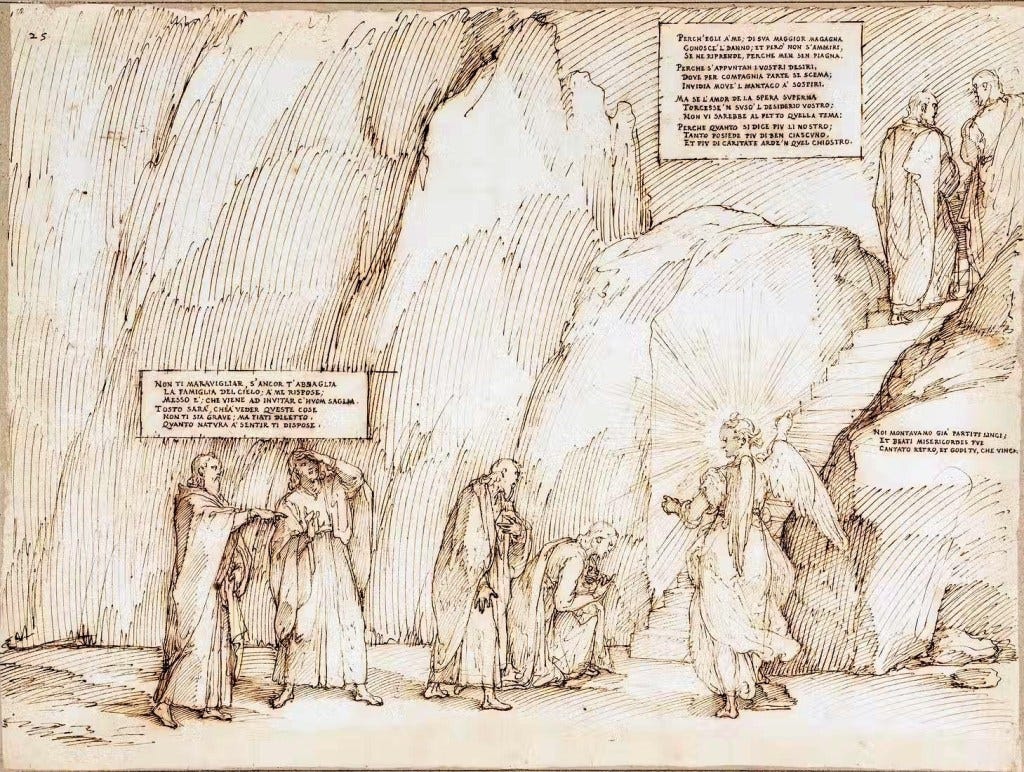
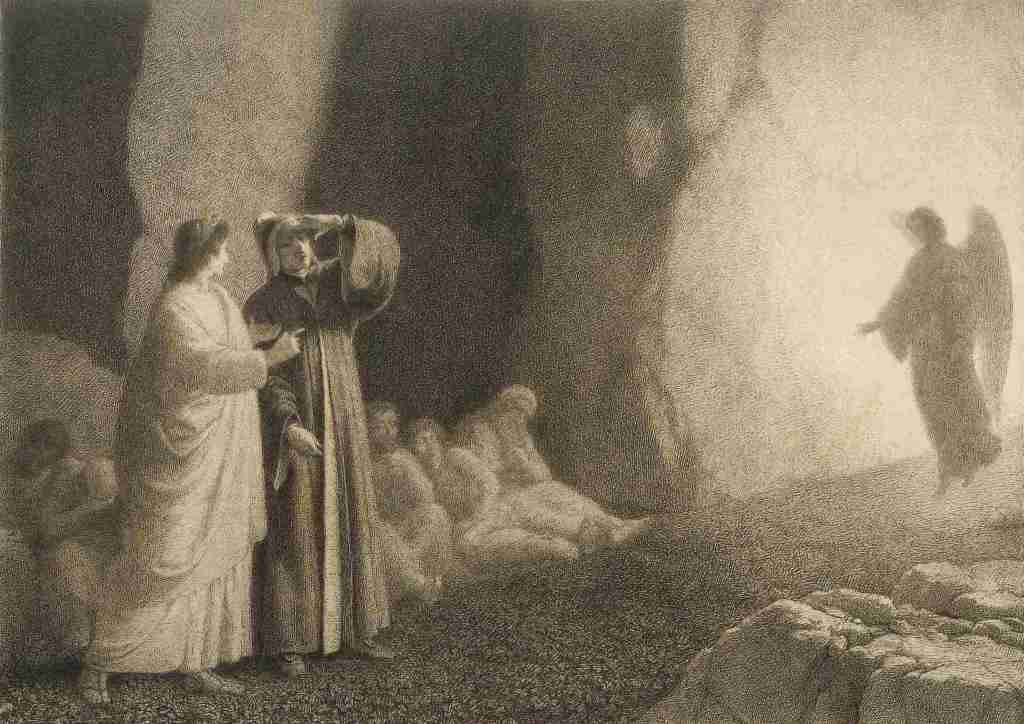
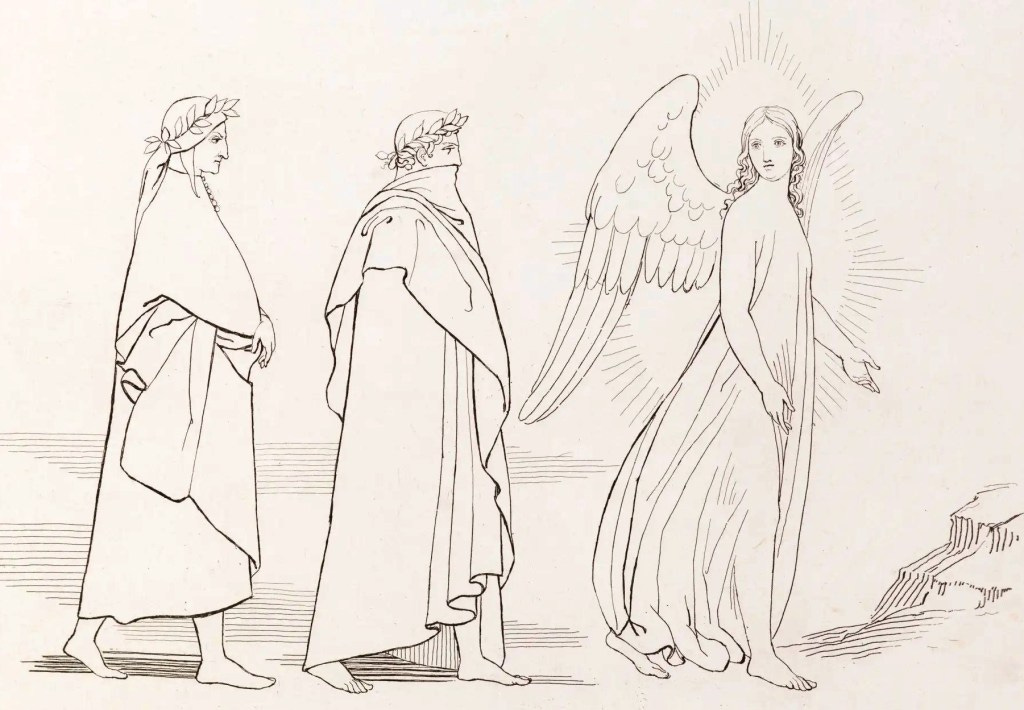
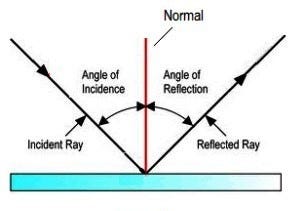

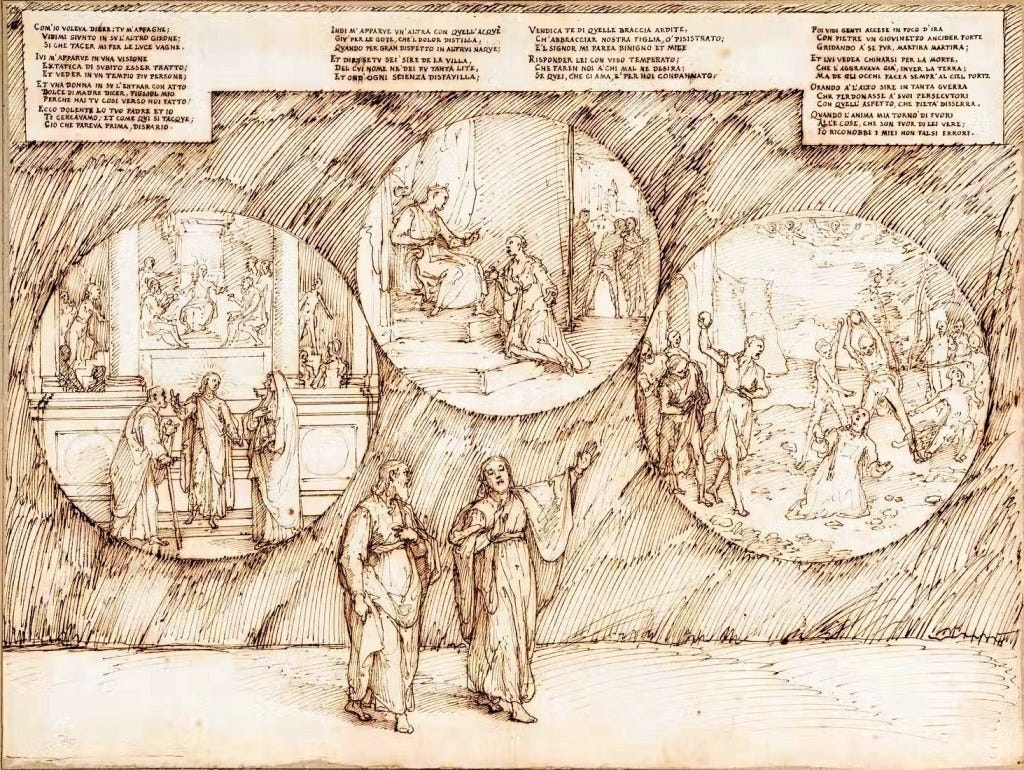


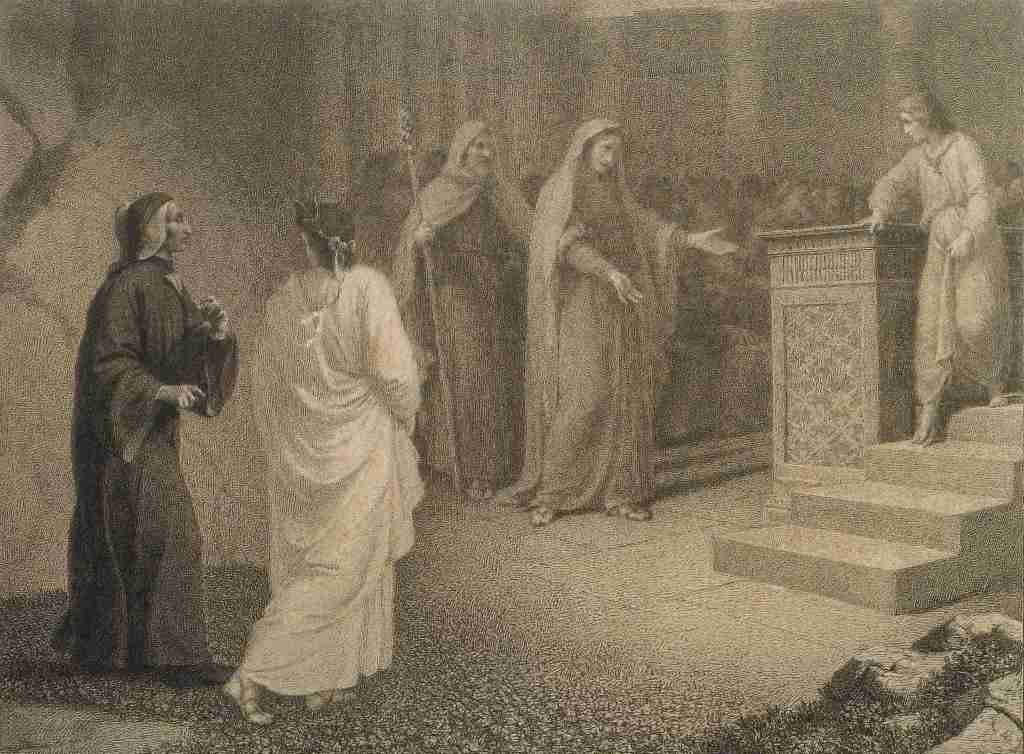

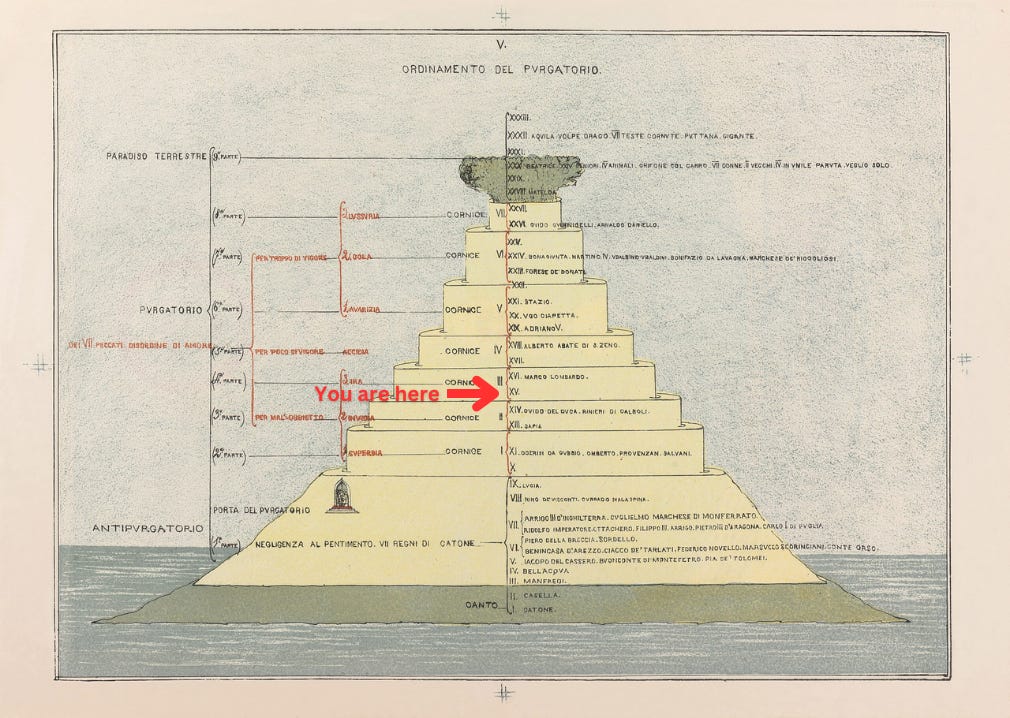

Oh my goodness.
I never thought about how the (very English) phrase 'much of a muchness' would be so confusing to someone learning English as an additional language.
The correct response, being, of course 'indeed' or perhaps 'quite.'
Vashik, I do hope all is well with you. 🙏 As I haven't seen a chat posted for Canto XV as yet, I'll share my favorite lines here (which I hope is okay). I found these words so appropriate, so apt for the times were living in.
"For when your longings center on things such that sharing them apportions less to each, then envy stirs the bellows of your sighs.
But if the love within the Highest Sphere should turn your longings heavenward, the fear inhabiting your breast would disappear;
for there, the more there are who would say 'ours,' so much the greater is the good possessed by each—so much more love burns in that cloister."
Purgatorio Canto XV : 49-57